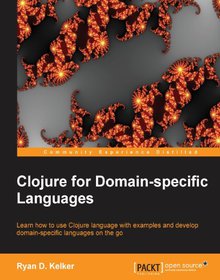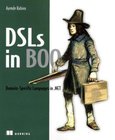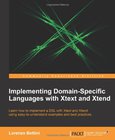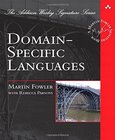Clojure for Domain-specific Languages

Book Details:
| Publisher: | Packt Publishing |
| Series: | Packt |
| Author: | Ryan D. Kelker |
| Edition: | 1 |
| ISBN-10: | 1782166505 |
| ISBN-13: | 9781782166504 |
| Pages: | 268 |
| Published: | Dec 18 2013 |
| Posted: | Nov 19 2014 |
| Language: | English |
| Book format: | |
| Book size: | 1.51 MB |
Book Description:
Learn how to use Clojure language with examples and develop domain-specific languages on the go Overview Explore DSL concepts from existing Clojure DSLs and libraries Bring Clojure into your Java applications as Clojure can be hosted on a Java platform A tutorial-based guide to develop custom domain-specific languages In Detail Clojure is a very new and rapidly growing language that runs on top of the JVM. The language being hosted on the Java platform allows for Clojure applications to use existing Java components. Although there are objects in Clojure, the language is not object oriented. "Clojure for Domain-specific Languages" is an example-oriented guide to building custom languages. Many of the core components of Clojure are covered to help you understand your options when making a domain-specific language. By the end of this book, you should be able to make an internal DSL. Starting with a comparison of existing DSLs, this book will move on to guide you through general programming, Clojure editing, and project management. The chapters after that are code oriented. "Clojure for Domain-specific Languages" tries to expose you to as much Clojure code as possible. Many of the examples are executed in a Read-Evaluate-Print-Loop environment, so the reader can also follow along on their own machine. This book uses Leiningen, but no prior knowledge of it is required. "Clojure for Domain-Specific Languages" aims to make you familiar with the Clojure language and help you learn the tools to make your own language. What you will learn from this book Understand the pros and cons of a domain-specific language Learn general programming design concepts Know the benefits of a Lisp-based syntax Edit Clojure files in Emacs Learn to operate a Read-Evaluate-Loop session from within Emacs Build Clojure projects with Leiningen Manipulate and make polymorphic objects in a non-object-oriented language Create a Twitter domain-specific language to understand Clojure, its Java, and Lisp foundation closely Use your Clojure applications inside of a Java project Approach An example-oriented approach to develop custom domain-specific languages. Who this book is written for If you've already developed a few Clojure applications and wish to expand your knowledge on Clojure or domain-specific languages in general, then this book is for you. If you're an absolute Clojure beginner, then you may only find the detailed examples of the core Clojure components of value. If you've developed DSLs in other languages, this Lisp and Java-based book might surprise you with the power of Clojure.
Download Link:
Related Books:
DSLs in Boo
Domain Specific Languages in .NET
A general-purpose language like C# is designed to handle all programming tasks. By contrast, the structure and syntax of a Domain-Specific Language are designed to match a particular applications area. A DSL is designed for readability and easy programming of repeating problems. Using the innovative Boo language, it's a breeze to create a DSL for your application domain that works on .NET and does not sacrifice performance.DSLs in Boo shows you how to design, extend, and evolve DSLs for .NET by focusing on approaches and patterns. You learn to define an app in terms that match the domain, and to use Boo to build DSLs that generate efficient executables. And you won't deal with the awkward XML-laden syntax many DSLs require. The book concentrates on w...
Implementing Domain-Specific Languages with Xtext and Xtend
Learn how to implement a DSL with Xtext and Xtend using easy-to-understand examples and best practices Overview Learn to quickly develop a domain-specific language with Xtext Implement any aspect of a DSL using Xtend, a fully featured Java-like programming language Discover how to test a DSL implementation and how to customize runtime and IDE aspects of the DSL In Detail Xtext is an open source Eclipse framework for implementing domain-specific languages together with its IDE functionalities. It lets you implement languages really quickly, and, most of all, it covers all aspects of a complete language infrastructure, starting from the parser, code generator, interpreter, and more. "Implementing Domain-Specific Languages with Xtext and Xtend&qu...
Domain - Specific Languages
When carefully selected and used, Domain-Specific Languages (DSLs) may simplify complex code, promote effective communication with customers, improve productivity, and unclog development bottlenecks. In Domain-Specific Languages, noted software development expert Martin Fowler first provides the information software professionals need to decide if and when to utilize DSLs. Then, where DSLs prove suitable, Fowler presents effective techniques for building them, and guides software engineers in choosing the right approaches for their applications. This books techniques may be utilized with most modern object-oriented languages; the author provides numerous examples in Java and C#, as well as selected examples in Ruby. Wherever possible, chapters are or...
2007 - 2021 © eBooks-IT.org



